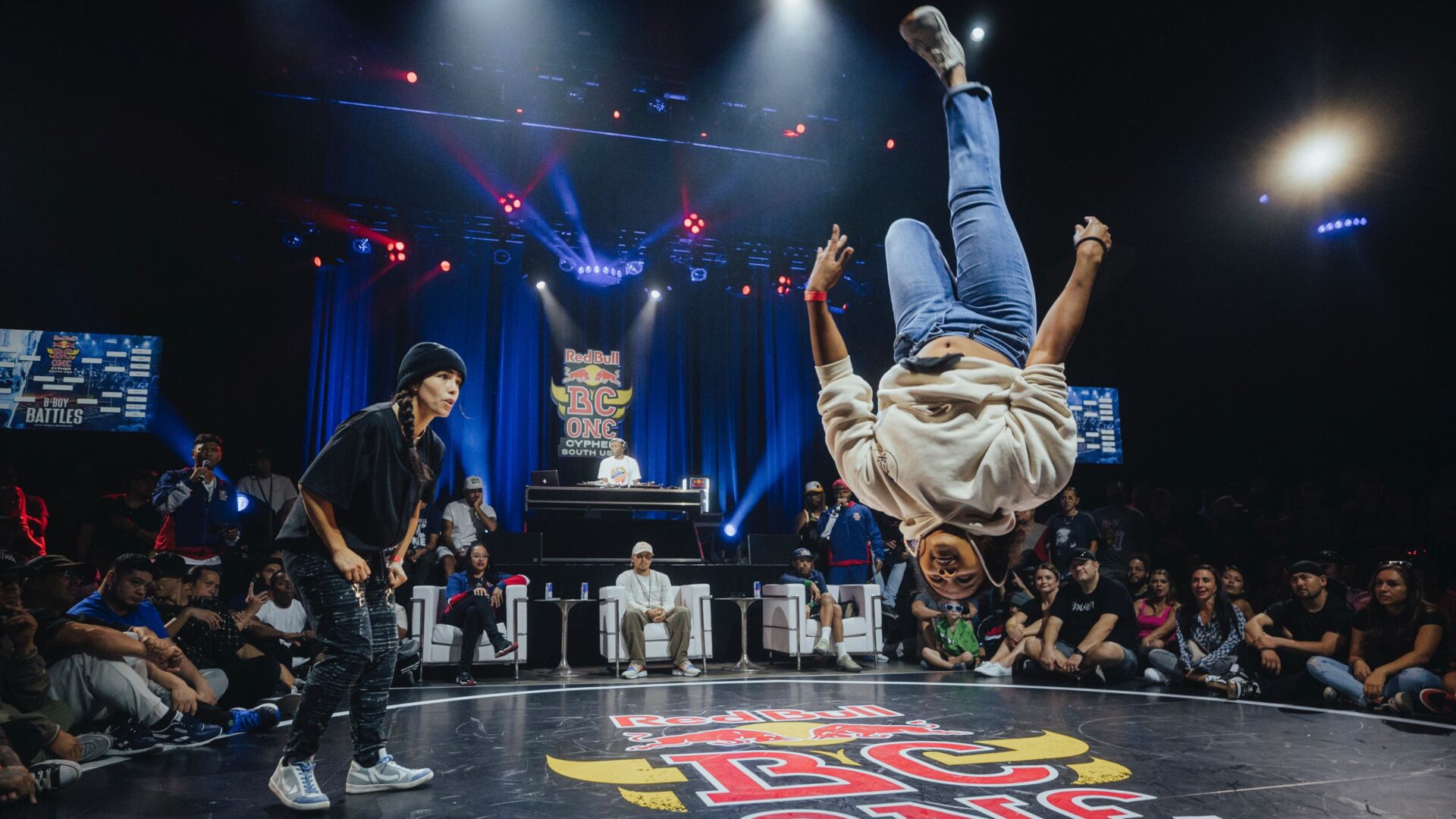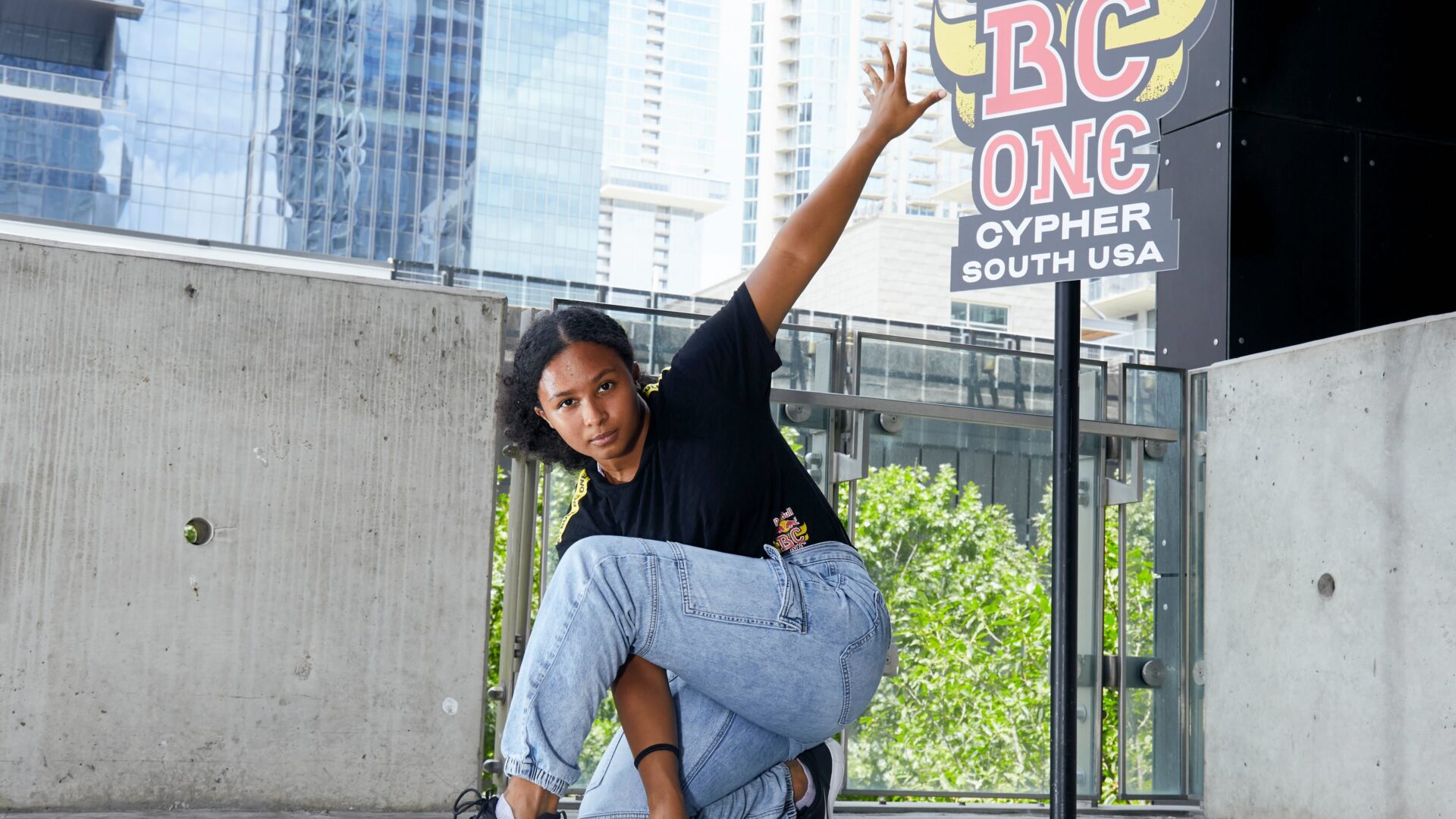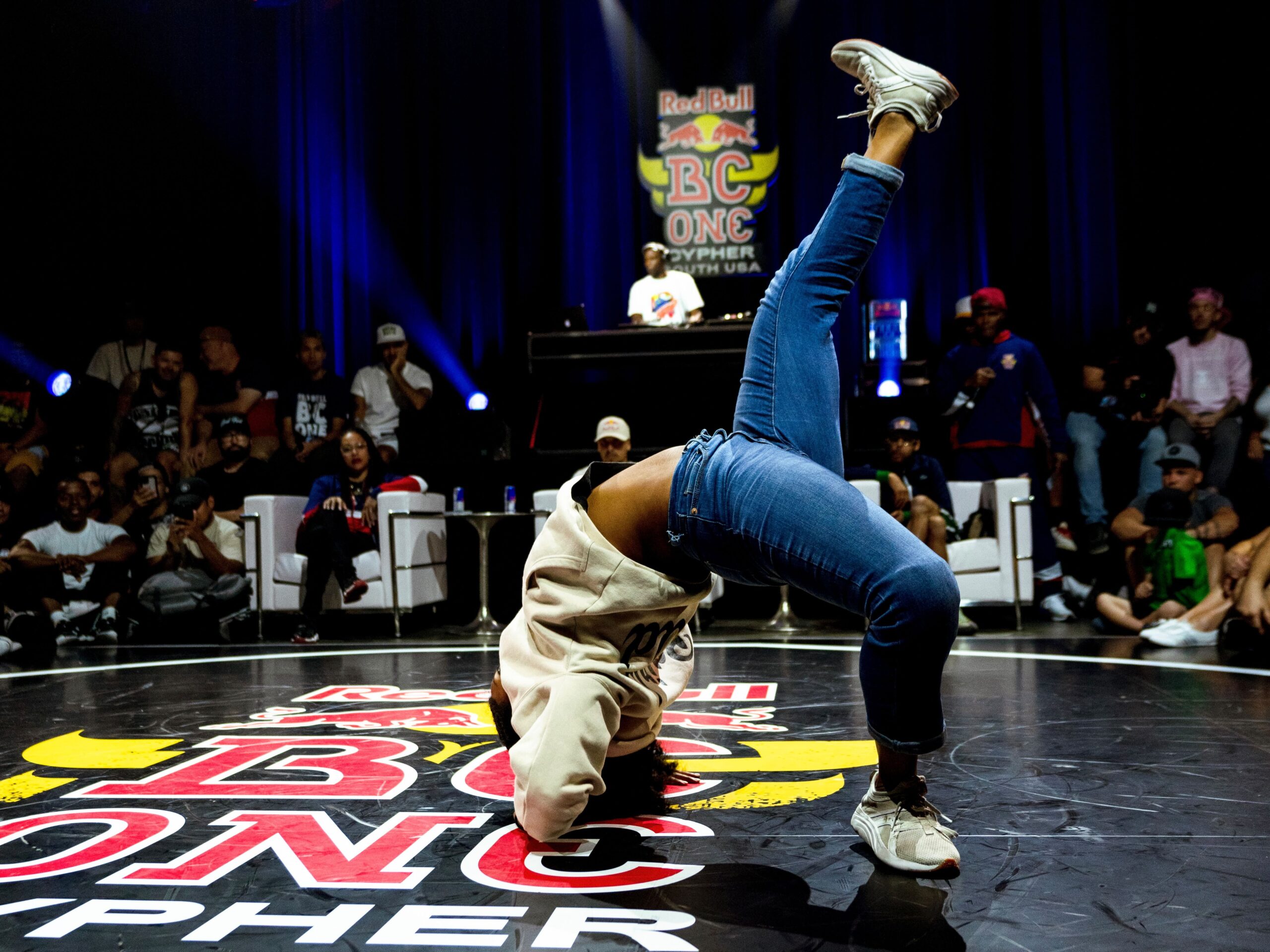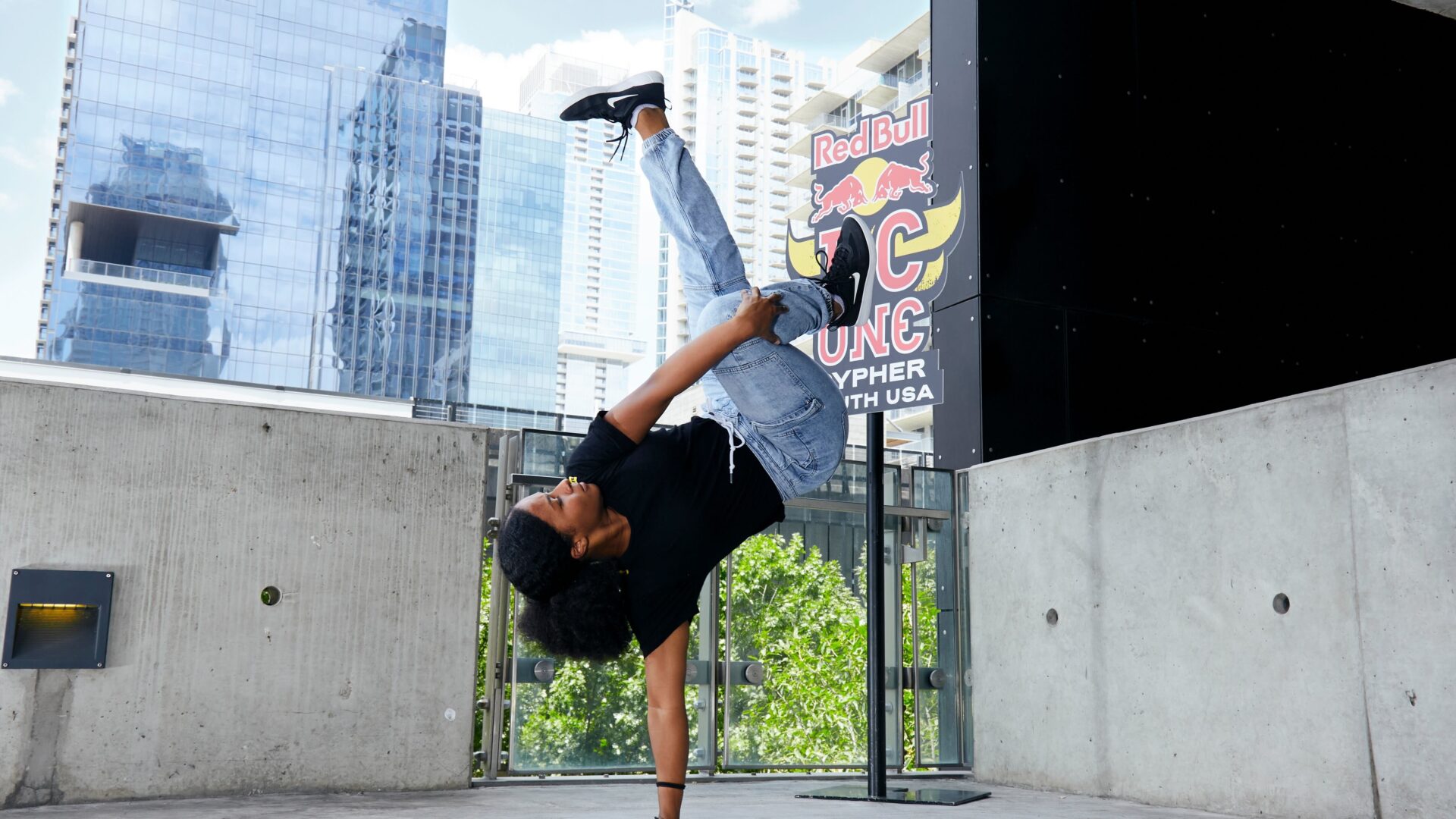
There’s something in the Houston water that makes its natives ooze talent and creativity at the fullest capacity, and 25-year-old Michiko Sharpe is no exception. After pouring her energy into hobbies such as soccer, Kung foo, tennis, and gymnastics, it was dance that eventually captured her heart and allowed her to fuse her prior athletic prowess into becoming a B-Girl.
You are not mistaken if the title “B-Girl” sounds familiar and gives you a sense of nostalgia. Coined in the early beginnings of New York City hip-hop culture in the 1970s, break-boys and break-girls – later shortened to B-Boys and B-Girls– was a name used to describe those who would dance during the break part of a record where all instruments drop and only the percussion remained. This style of dance became a staple and has evolved over the decades while keeping its fundamental, eclectic roots. The Red Bull BC One Cypher competition in Austin, Texas, brought out some of the South’s finest dancers, including B-girl Michiko, who I had the pleasure of speaking with before the competition went down.
With myself being from Fort Worth, Texas, – a city where hip-hop-inspired forms of art lack visibility, I went into speaking with Michiko a bit jaded about the vibrant creative communities Texas can foster. However, after our nearly 40-minute conversation and experiencing firsthand the Red Bull BC One Cypher South competition, it’s safe to say that the hometown heroes upholding the dance scene across Texas are a force to be reckoned with.
Check out our interview below with the B-Girl shaking shit up in the dance world.

What marked the start of B-Girl Michiko?
“When I was in middle school, that was like the height of the Step Up movies, so I was inspired. It was that era where being able to dance made you really cool, and I wanted to branch out and get into movement. So, going into my eighth-grade year, I decided to take a hip-hop dance class as an elective. The teacher was a B-Boy, and even though it was just a generic hip-hop choreo class, I would always see him practicing. At lunch, I would eat really quick and go over and just watch him, and I thought it was so cool.”
“Him and his crew did a performance at my gymnastics gym, which is where I saw this one dancer named Judo (aka Joel Rivera) – who is actually battling today. He became a mentor and friend, leading me through and keeping me grounded. He’s probably taught most of the Houston scene, like many of us are where we are because of him.”
“Red Bull really led the way in having B-Girl battles in 2018, so I got invited to the first U.S B-Girl Cypher, which was crazy. I lost the first round, but still, it doesn’t matter. I was just so honored and happy to be able to go and to be a part of that. That’s the reason I kept breaking despite wanting to quit sometimes.”
B-Girls are clearly a force in the breaking scene, but what’s your personal journey been like navigating a primarily male-dominated space?
“You can deal with people looking down on you or belittling you or not taking you seriously. I was just getting to a point where I was dealing with that. I was still in gymnastics and had health issues, and I was like, ‘I don’t know if I can keep doing this.’ This was supposed to be a hobby and for fun, and to be like this social outlet, but I come here and I’m getting harassed.”
“A lot of people underestimate the girls or think that our skill level doesn’t match the guys, but over the years, we’ve seen the rise of more female-centered categories, it’s actually gotten to the point where a lot of people actually prefer to watch the B-Girl battles over the B-Boys because there is a lot more experimentation.”

Take us to the floor and into your mind during these Red Bull Dance cyphers. Is there a certain strategy you can let us in on?
“There are a lot of like breakers that still haven’t even fully figured out a specific strategy. I mean, it’s something that I struggle with because it’s so different from gymnastics in the fact that it’s like, you have you go in and have a plan, but you also have to be ready to throw that plan out the window at a moment’s notice or completely alter it. Some people have a full strategy going into cyphers, and others like to figure it out on the fly.”
“You can also start to overthink what your next move is or what you should change or add in based on what another breaker is doing, but I just tell myself, ‘hey, even though this person did whatever, I’m gonna stick to what I can, because I believe in what I’m doing right now and that it doesn’t matter what that person did.”
What impact do you hope to have – or have already seen– in regards to the next generation of Black girls wanting to get into the realm of dance or gymnastics?
“I think the thing I want to see is that they don’t feel like it’s something that they can’t do or believe that it’s only meant for one type of person. Even in gymnastics, I saw it, like when I was a kid. I have a picture of my gymnastics team, and it was all white girls, one Asian girl, and then me. The last gym I worked out and trained at was actually Simone Biles‘ gym, and I was there for five years. During that time, I saw so many more Black girls doing the sport.”
“You grow up seeing people like Simone or Gabby Douglas doing it – girls that look like you, women that look like you doing it at such a high level, you feel like, ‘oh, this isn’t something that is just reserved for certain people. This is for me as well, and I can do it, and I can do it just as well.’ That’s what I hope to do. When girls see me dancing, I want them to be like, ‘oh man, I wanna do that, and I can do that.'”
How do you maintain and prioritize your mental and physical health?
“I, unfortunately, have two vestibular disorders, so when I get really stressed out, it can actually trigger it. So, if I feel like I’m starting to get too overwhelmed to the point where I’m physically feeling it, I make sure to take care of myself.”
“As for my mental health, I grew up and was around so many Olympians, and I really saw the toll stress can have on an athlete. So, I kind of try to remind myself, ‘all right, am I doing this because I want to do it, or am I doing it because I have some expectation that I’m trying to meet? Am I trying to reach a goal? And if I’m trying to reach a goal, am I focusing too much on the goal and not too much on the steps that it takes to get me there?'” I try to refocus and take that time to like ground myself. I also take time for myself to run through things without any sort of stress, without that anticipation, and just dance freely. I’ve recently had that issue of just stressing myself out, focusing too much on the outcome or the thought of, ‘am I gonna disappoint somebody?'” I have high expectations of myself, but sometimes I sit and ask myself, ‘Is it even worth it?’ If this is something I love, this is a hobby, and it shouldn’t stress me out to that point.”
Why is it important that Red Bull Dance continues to facilitate events like the BC One cyphers across the globe?
“It’s really given a platform for a lot of people that don’t have one, and for a lot of people, they do use this as an outlet to showcase their passion, or this was the thing that saved their life. I’ll tell people that Red Bull is one of the few companies that genuinely will give a lot to up-and-coming talent and offer support in everything they do. You rarely see that, and I really think that motivates people to strive to do more. It gives dancers a taste of what these events can do, and that little sprinkle can be a driving force for somebody for years.”

All I have to say is — Keep your eye on the B-Girls of the world. Red Bull Dance recently kicked off their Bull BC One All-Star Tour, a platform for education, connection, and B-Boys at all levels the chance to learn from some of the world’s most elite breakers. Be on the lookout for the Red Bull BC One World Final on November 12 in New York City!
About Rhyann: Rhyann Sampson serves as the social community lead for Girls United. She is a Hampton University graduate from Dallas, Texas, with a passion for storytelling and visual creativity.